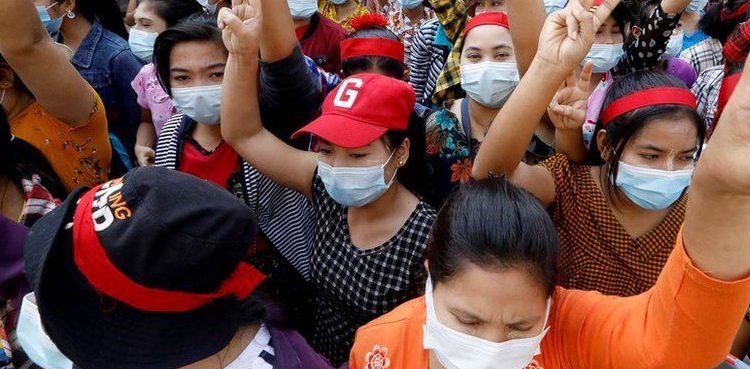Thousands of people took to the streets of Yangon on Saturday to denounce this week’s coup and demand the release of elected leader Aung San Suu Kyi despite a blockade on the internet by the junta.
In an upwelling of anger in the country’s largest city protesters chanted, “Military dictator, fail, fail; Democracy, win, win” and held banners reading “Against military dictatorship”. Bystanders offered them food and water.
Many in the crowd wore red, the colour of Suu Kyi’s National League for Democracy (NLD) which won Nov. 8 elections in a landslide, a result the generals have refused to recognise claiming fraud.
Yangon streets had a festival atmosphere late Saturday as a cacophony of car horns blared and thousands marched toward City Hall. Drivers leaned out of their cars and raised the three-finger salute. Bystanders returned the gesture. Some held up NLD flags or pictures of Suu Kyi. Many clapped and danced.
The protest built despite a blockade of the internet imposed after they first began to gather.
Monitoring group NetBlocks Internet Observatory reported a “national-scale internet blackout”, saying on Twitter that connectivity had fallen to 16% of ordinary levels. Witnesses reported a shutdown of mobile data services and wifi.
The junta did not respond to requests for comment. It extended a social media crackdown to Twitter and Instagram after seeking to silence dissent by temporarily blocking Facebook, which counts half of the population as users.
Facebook said it was “extremely” concerned about the internet shutdown, “strongly” urging the junta to unblock social media.
“At this critical time, the people of Myanmar need access to important information and to be able to communicate with their loved ones,” Facebook’s head of public policy for Asia-Pacific emerging countries, Rafael Frankel, said in a statement.
The United Nations human rights office said on Twitter that “internet and communication services must be fully restored to ensure freedom of expression and access to information.”
Norwegian mobile network provider Telenor ASA said authorities had ordered all mobile operators to temporarily shut down the data network, although voice and SMS services remained open.
Many activists had sidestepped the Facebook ban by using virtual private networks to conceal their locations, but the more general internet disruption will severely limit their ability to organise and access independent news and information.
Myanmar civil society organisations appealed to internet providers and mobile networks to resist the junta’s orders, saying in a joint statement they were “essentially legitimising the military’s authority”.
Telenor said it had stressed to the authorities that access to telecom services should be maintained. However it added it was bound by local law and its first priority was the safety of its local workers.
“We deeply regret the impact the shutdown has on the people in Myanmar,” it said in a statement.
Amnesty International’s deputy regional director for campaigns, Ming Yu Hah, said shutting down the internet amid a coup and the COVID-19 pandemic was a “heinous



Leave a Comment